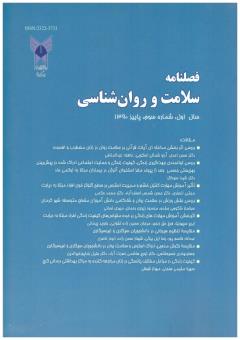مقايسۀ نگرش مذهبي، ادراك استرس و سلامت روان در دانشجويان سيگاري و غير سيگاري . نویسندگان : (جعفربهادري خسروشاهي / دكتر تورج هاشمي نصرت آباد / دكتر جليل باباپورخيرالدين)
محورهای موضوعی : ارتقای سلامت و بیماری ها
کلید واژه: ادراك استرس, دانشجويان, سلامت رواني, سيگار و نگرش مذهبي.,
چکیده مقاله :
چكيده در این مطالعه با هدف مقايسه نگرش مذهبي، ادراك استرس و سلامت روان در دانشجويان سيگاري و غيرسيگاري انجام شد. اين پژوهش پس رويدادي از نوع مورد شاهدي است. نمونۀ آماري اين پژوهش شامل 200 نفردانشجو (100 نفر سيگاري و 100 نفر غيرسيگاري) بودند كه داوطلبانه انتخاب شدند. سپس آزمودني ها با استفاده از پرسش نامۀ نگرش سنج مذهبي براهني، مقياس ادراك استرس (PSS) و پرسش نامۀ سلامت عمومي(GHQ) ارزيابي شدند. براي تحليل داده ها از آزمون t مستقل و ضريب همبستگي پيرسون استفاده شد. نتايج پژوهش نشان داد که دو گروه از لحاظ نگرش مذهبي، ادراك استرس و سلامت روان تفاوت معناداري با هم دارند،. به طوري كه ميانگين نگرش مذهبي و ادراك استرس مثبت در دانشجويان غيرسيگاري، به طور معنادار بيش تر از دانشجويان سيگاري بود و ميانگين ادراك استرس منفي و سلامت رواني در دانشجويان سيگاري، به طور معناداری بيش تر از دانشجويان غيرسيگاري بود. همچنين يافته ها نشان داد كه نگرش مذهبي در هر دو گروه با ادراك استرس مثبت رابطۀ مثبت و با ادراك استرس منفي و سلامت رواني رابطۀ منفي دارد. از سويي، سلامت رواني با ادراك استرس مثبت رابطۀ منفي و با ادراك استرس منفي رابطۀ مثبت دارد. بنابراين، براساس يافته هاي پژوهش مي توان نتيجه گرفت كه با افزايش نگرش مذهبي دانشجويان و آموزش راهبردهاي مقابله با استرس مي توانيم از سیگاری شدن آن ها جلوگيري كنيم.
Abstract Smoking is a chronic phenomenon that affects physical, mental and social to follow, so that person is suffer a loss in the individual and social action. Religious attitude, perceived stress and mental health are differ in smoker and non-smoker students. The purpose of present study was investigating the religious attitude, perceived stress and mental health in smoker and non-smoker students. The study was case-control. The study sample included 200 students (100 smokers and 100 non-smokers) were selected as voluntary. Then participants were assessed with the Baraheni Religious Attitude Inventory, Perceived Stress Scale (PSS) and General Health Questionnaire (GHQ). Data were analyzed using t test for independent groups and correlation coefficient. The results showed that there were significant differences between two groups of religious attitude, perceived stress and mental health. So that the mean of religious attitude and positive perceived stress in non-smoker students was significantly higher than smoker students and the mean of negative perceived stress and mental health in smoker students was significantly higher than non-smoker students. Also result showed that religious attitude in both groups have posetive relationship with positive perceived stress and negative relationship with negative perceived stress and mental health. On the other hand, mental health have negative relationship with positive perceived stress and have positive relationship with negative perceived stress. Result showed that with increasing student religious attitude and training strategies of better coping with stress, we can prevent individuals from addiction.

